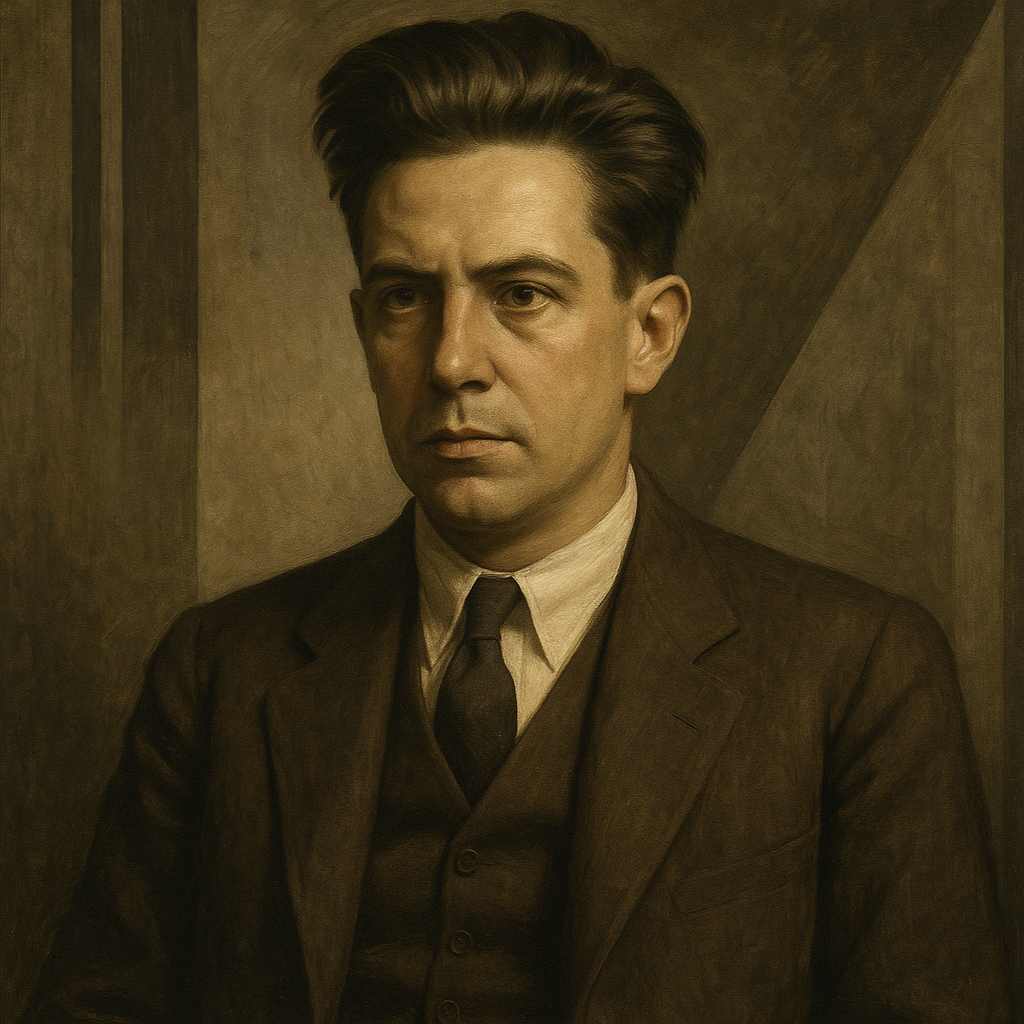A Persuasion
Hart Crane
1899 to 1932

If she waits late at night
Hearing the wind,
It is to gather kindnesses
No world can offer.
She has drawn her hands away.
The wind plays andantes
Of lost hopes and regrets,—
And yet is kind.
Below the wind,
Waiting for morning
The hills lie curved and blent
As now her heart and mind.
Hart Crane's A Persuasion
Hart Crane’s A Persuasion is a brief yet profoundly evocative poem that encapsulates themes of longing, isolation, and the paradoxical nature of human emotion. Though deceptively simple in structure, the poem is rich in imagery, emotional depth, and philosophical undertones. Written during the early 20th century—a period marked by modernist experimentation and existential questioning—Crane’s work reflects both personal and collective anxieties about meaning, connection, and the passage of time. This essay will explore the poem’s historical and cultural context, its use of literary devices, its central themes, and its emotional resonance, while also considering Crane’s broader poetic project.
Historical and Cultural Context
Hart Crane (1899–1932) was a major American poet whose work bridged the gap between high modernism and romantic lyricism. His poetry often grappled with themes of transcendence, disillusionment, and the search for beauty in a fragmented world. A Persuasion, though not as widely discussed as his longer works like The Bridge, shares the same preoccupation with emotional and metaphysical longing.
The early 20th century was a time of immense social and artistic upheaval. The devastation of World War I, the rise of industrialization, and the increasing secularization of society led many artists to question traditional forms of meaning. Modernist poets like T.S. Eliot and Wallace Stevens explored fragmentation and existential doubt, while Crane sought a more ecstatic, almost mystical vision of unity. A Persuasion can be read as a microcosm of this tension—between despair and hope, isolation and connection.
The poem’s female subject, waiting late at night, embodies a kind of existential watchfulness. She is not merely passive but engaged in an act of gathering "kindnesses / No world can offer." This suggests a spiritual or emotional hunger that the material world cannot satisfy—a theme resonant with modernist disillusionment yet also reminiscent of Romantic yearning for the sublime.
Literary Devices and Imagery
Crane’s poem is constructed with a careful balance of concrete imagery and abstract emotion. The opening lines—
If she waits late at night
Hearing the wind,
immediately establish a mood of solitude and anticipation. The conditional "If" introduces a speculative tone, as though the speaker is imagining or interpreting the woman’s actions rather than describing them definitively. This ambiguity allows the poem to function both as an intimate portrait and a universal meditation on waiting and desire.
The wind is a central motif, serving as both a literal and metaphorical force. It "plays andantes / Of lost hopes and regrets," transforming natural phenomena into a kind of music—a melancholic symphony of human experience. The use of "andantes," a musical term indicating a moderate tempo, suggests a slow, lingering sorrow rather than a sudden outburst of grief. The wind, though associated with loss, is paradoxically "kind," implying that even in sorrow, there is a form of consolation.
The poem’s closing lines—
The hills lie curved and blent
As now her heart and mind.
employ a striking visual metaphor. The hills, "curved and blent," mirror the woman’s internal state, suggesting harmony between emotion and thought. The blending of landscape and psyche is a hallmark of Crane’s work, where external nature often reflects inner turmoil or resolution.
Themes: Longing, Kindness, and Paradox
One of the most compelling aspects of A Persuasion is its exploration of paradoxical emotions. The woman waits not for something tangible but for "kindnesses / No world can offer." This phrase suggests a metaphysical yearning—perhaps for divine grace, artistic inspiration, or unconditional love. The idea that kindness exists beyond the material world aligns with Crane’s broader poetic vision, which often sought transcendence amid despair.
The wind embodies another paradox: it carries "lost hopes and regrets" yet "is kind." This duality speaks to the human capacity to find solace even in sorrow. The wind’s music, though mournful, provides a form of companionship, much like the way melancholy can be strangely comforting in its familiarity.
The final lines introduce a theme of reconciliation. The hills’ curvature suggests softness and continuity, mirroring the woman’s heart and mind in a state of unity. Unlike the turbulent wind, the hills are stable, implying that after a night of emotional turbulence, there is a return to balance.
Comparative Analysis: Crane and His Contemporaries
Crane’s work can be usefully compared to that of other modernist poets, particularly T.S. Eliot and Wallace Stevens. Eliot’s The Waste Land similarly explores fragmentation and longing, but where Eliot’s tone is often bleak and ironic, Crane’s retains a lyrical hopefulness. In A Persuasion, even the wind’s sorrow is "kind," suggesting an underlying faith in beauty.
Stevens, another poet concerned with perception and reality, often meditated on the interplay between imagination and the external world. Like Stevens, Crane blurs the line between inner and outer landscapes, as seen in the merging of the hills and the woman’s psyche. However, Crane’s emotional intensity distinguishes him from Stevens’ more detached philosophical musings.
Biographical and Philosophical Insights
Crane’s personal struggles—with his sexuality, alcoholism, and eventual suicide—infuse his work with a sense of urgency and vulnerability. A Persuasion can be read as a reflection of his own search for connection in a world that often felt alienating. The woman’s nocturnal vigil may parallel Crane’s own artistic and emotional solitude.
Philosophically, the poem engages with the idea of absence as a presence. The woman does not receive the kindness she seeks, yet the act of waiting itself becomes meaningful. This aligns with existentialist thought, where the search for meaning is itself a form of meaning-making.
Emotional Impact and Conclusion
Despite its brevity, A Persuasion lingers in the mind due to its emotional precision and haunting imagery. The poem captures a moment of quiet intensity—a woman listening to the wind, gathering unseen kindnesses, and ultimately finding a fragile harmony. Crane’s ability to convey profound emotion with minimal words is a testament to his poetic mastery.
The poem’s emotional power lies in its refusal to resolve neatly. The wind is both mournful and kind; the woman is isolated yet connected to the landscape. This ambiguity mirrors the complexities of human experience, where sorrow and comfort often coexist.
In conclusion, A Persuasion is a microcosm of Hart Crane’s larger poetic vision—one that embraces contradiction, seeks transcendence, and finds beauty in longing. Its historical context, rich imagery, and thematic depth make it a compelling subject for analysis, while its emotional resonance ensures its enduring appeal. Like the woman in the poem, we too are left waiting, listening, and finding solace in the music of the unseen.
This text was generated by AI and is for reference only. Learn more
Want to join the discussion? Reopen or create a unique username to comment. No personal details required!



Comments
No comments yet. Be the first to comment!